Greenpeace demands end of area payments, as Dyson nets £1.6m
 James Dyson © Action Press/REX/Shutterstock
James Dyson © Action Press/REX/Shutterstock Environmental lobby group Greenpeace is pushing for an end to area-based payments, following publication of the latest data on farmer subsidy receipts.
In its annual analysis of the top 100 recipients of direct payments, the organisation points to “billionaires, aristocrats and companies based in tax havens” as the main beneficiaries.
Vacuum cleaner tycoon Sir James Dyson is listed as the largest private recipient of basic payments, worth £1.6m last year, even though he is listed 14th on the Sunday Times Rich List, with an estimated fortune of £7.8bn.
See also: Farm leaders defend subsidies amid Greenpeace criticism
Despite the inclusion of so-called “greening rules” applied to BPS last year, Greenpeace says this has made no difference to the distribution of farm subsidies in the UK.
“Overall, the top 100 recipients received a combined £49.9m in basic payments last year, more than was paid out to the bottom 35,000 combined,” it notes.
Rethink
Greenpeace policy director Doug Parr says the time has come for a radical rethink of farm support – and Brexit provides a golden opportunity.
“It’s simply indefensible that taxpayers’ money is being used to bankroll huge subsidies going to billionaires largely on the basis of how much land they own,” he said.
“Public money should reward farmers for contributing to the public good, whether it’s by producing sustainable food, building thriving rural economies, reducing flood risk or protecting our wildlife.”
Dr Parr believes new Defra secretary Michael Gove has said some encouraging things about reforming farm subsidies so they improve environmental protection and food quality.
“Now he needs to show he’s willing to take on the vested interests profiting from the status quo and push through a major reform.”
Misguided
But NFU vice-president Guy Smith says the Greenpeace claims are misguided.
“The issue of capping subsidies has been debated for over 20 years,” he said. “On the surface it looks sensible and just, but once you consider the detail, it becomes anomalous.”
Mr Smith suggests that limiting payments to smaller farms will simply encourage large estates to split themselves into smaller land parcels.
“There is also a question of where you should set the threshold and why. Is someone who earns £10,000 in subsidy any more deserving than someone who earns £15,000, or £100,000?”
Mr Smith points out that it is often the largest landowners who are doing the most in terms of environmental protection, and also employing more people, so contributing to the rural economy.
New policy
As for revamping the way farmers are supported after Brexit, Mr Smith says the future model should take into account the terms of trade of any deal with the EU.
“We are open to suggestions, but whatever replaces the CAP must give farmers enough time to adjust.
“It must also reflect the overall level of support being offered to our main competitors, otherwise British farmers will struggle to compete.”
It is likely that volatility mitigation (as provided by the current support system) will have to be included, as well as measures to protect the environment and improve productivity.
